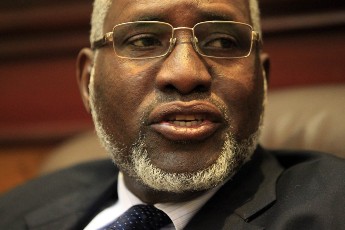Sudan-Iran relations not meant to threaten Gulf states: VP
November 30, 2013 (KHARTOUM) – Sudanese vice-president Al-Haj Adam Youssef has stressed that his country’s relations with Iran will not come at the expense of its ties with Arab Gulf states, denying reports of tensions with Saudi Arabia.

The mostly Sunni Muslim Arab Gulf states are wary of Iranian influence in the Middle East, fearing the Shiite-led country is seeking regional dominance that will stir sectarian tensions. The Syrian conflict has also increased the divide between the two sides, with Arab monarchies supporting the rebels and Iran backing the Al-Assad regime.
The vice-president stressed that Sudan’s ties with the Arab Gulf states are based on geography, kinship, and religion, describing the relationship as strategic and eternal.
He also said Sudan remained keen to maintain and develop ties with Gulf states.
The Sudanese government has allowed Iranian warships to dock in Port Sudan three times in the past year, but denied suggestions of a military alliance between the two countries.
The Saudi pro-government Al-Riyadh newspaper blasted Khartoum over its decision to allow Iranian warships to dock, saying Sudanese president Omer Hassan al-Bashir’s regime is now at odds with most Arab countries and is struggling to attract Arab or foreign investors.
Last August, Riyadh blocked a plane carrying the Sudanese president from entering its airspace en route to Iran to attend the inauguration ceremony of the new president Hassan Rouhani.
Bashir, who performed the Muslim Hajj (pilgrimage) earlier this year, did not meet with King Abdullah bin Abdulaziz during the visit, despite the Saudi monarch holding separate talks with the Turkish and Pakistani presidents who also performed Hajj this year.
Youssef maintains that Sudan’s ties with Saudi Arabia remains strong, pointing to large Saudi economic investments in Sudan, as well as the kingdom’s ongoing support to Sudan in regional and international forums.
“All rumours about tepid relationship between the two countries fall within the category of evil purposes, emanating from those who seek to play in troubled waters”, he said.
NEUTRAL ON EGYPT
Youssef also touched on Sudan’s relations with Egypt following the ouster of former president Mohamed Morsi, saying Sudan doesn’t interfere in Egypt’s domestic affairs and that his government respects the choice of the Egyptian people.
He affirmed that Sudan would mediate between the government and the Islamic opposition if asked to do so by the Egyptian government.
Sudan’s Islamist government appeared uncomfortable with the developments in Egypt given the common ideology it shared with Morsi and the Freedom and Justice Party (FJP) which brought him to power.
However, Khartoum insisted that it is remaining neutral on the political change in Egypt, stressing it is an internal matter.
Unlike most Arab leaders, the Sudanese president has not yet congratulated interim Egyptian president Adli Mansour on his new role.
(ST)
